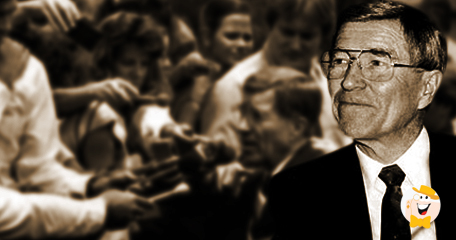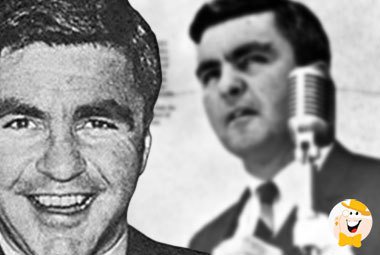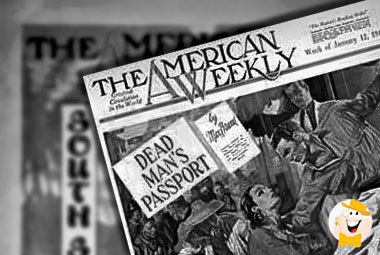
I was working as a reporter for the Weekly American, a newspaper owned by Evan Mecham, a Mormon Bishop who would serve briefly as governor of Arizona, when I got involved in politics.
My entry into the political scene came about because of my editor Mike Jarvis, who was managing the Congressional campaign of Sam Steiger, a rancher from Prescott, AZ.
"How'd you like to join a softball team and work to get a good guy elected to Congress?," Mike asked me one morning.
He said Steiger, a native New Yorker, was planning to run for Congress on the Republican ticket and was forming a softball team to travel around the state and seek votes. Mike said we would play softball against a local team and then Steiger would make a speech.
"That's all you have to do," he said. "After he makes his speech, we go home. It'll be a grassroots organization all the way."
Steiger was born in New York City and visited Arizona when he was 14. He stayed in a dude ranch, fell in love with horses and the cowboy way of life. After returning to New York, he attended Cornell University and Colorado A&M where he won a Bachelor of Science degree.
After college, he enlisted in the U.S. Army and served as a tank platoon leader in the Korean conflict where he was awarded a Silver Star and a Purple Heart. After his honorable discharge, Steiger moved to the mile-high city of Prescott, AZ. where he bought a ranch.

He was working as a ranch hand in Springerville, a small cowboy town in 1959 when he and a couple of cowboy pals noted that Yavapai County had never elected a Republican representative.
"That's because the right person hasn't run for office," Steiger declared. "I'm going to give it a shot."
He ran for office and was elected to the Arizona State Senate. Steiger entered politics as a maverick and stayed that way all his life.
He wrote a column for a Phoenix newspaper claiming that elected members of the legislature had sold their votes for money and engaged in making backroom deals.
Sam served two terms in the statehouse before running for Congress against George "Duke" Senner in 1964. All the newspapers within his district, including the Arizona Republic, endorsed him, but Senner won the election in a narrow victory. In 1966 he decided to run again and that was when Jarvis decided to join his time.
My publisher Evan Mecham liked Sam and gave Jarvis and the rest of us all the time we needed to work on his campaign. Sam had a friend who owned an airplane and he flew us around the state to Tucson, Miami, Payson and Globe to campaign for votes.
I remember the day we flew to Globe and played softball against an all-girls team. Nobody told us they were the state champions! They beat us 8-0 and we got only one hit, thanks to a talented red head who threw the ball so fast we could barely see it.
When we weren't on the campaign trail, we played poker either at an American Legion Post or at somebody's house.
Steiger was a down to earth guy with a good sense of humor. He beat Senner handily and hired Jarvis to be his Congressional aide in his Phoenix office.
Mecham hired Art Heenan, a veteran Phoenix journalist, to replace Jarvis as editor. Steiger flew to Washington D.C. to be sworn in as a U.S. Congressman. Three months later he returned to Phoenix. He invited me to join him and Jarvis for lunch at Durant's, a popular restaurant on Central Avenue in Phoenix.
My first question was:
"Sam, what do you have to report from the nation's capitol after three months in Washington D.C?"
Steiger shook his head.
"When I flew back there, i asked myself what I, a lowly rancher from Prescott, was doing in the company of such learned ladies and gentlemen in the U.S. Congress and Senate," he said. "After three months, I find myself wondering what I am doing in the company of such a bunch of jerks.
"I wanted to find out who was minding the store -- who was looking out for the American people," Steiger said. "I can assure you gentlemen of one thing -- nobody is minding the store. They're all looking out for themselves."
Steiger made headlines for his maverick ways:
He was disgusted with the antics of some of his fellow legislators who would often show up drunk before a vote. He also called for a code of ethics that would include disclosure of assets, liabilities and gifts given to elected politicians, their spouses and staff members.

He said some of the Congressmen and Senators were so drunk 'you wouldn't want to hire them to wheel a wheelbarrow.'
The Americans for Democratic Action gave him a zero rating while the conservative Americans for Constitutional Action awarded him a 100 percent rating. Steiger also strongly opposed controls on strip mining and vocally supported coal companies and miners around the U.S.
He was popular with voters at home and faced only one close election. That happened because of Watergate when he defeated his opponent by just over 3,000 votes.
In 1975 he ran into a bizarre incident that was widely publicized when a herd of burros began running loose near paulden. The burros were wild and frightened school children in the area. Steiger took a .30 caliber carbine out of his car and shot two of them when they attacked him. The owner tried to sue him in civil court and the story made headlines for months.
Steiger ran for the U.S. Senate against a fellow Congressman John Conlan, son of famed National League umpire Jocko Conlan. He won the primary election after a bitter fight but lost the general election to Dennis DeConcini, an attorney from Tucson.
In his later years Steiger became dissatisfied with the Republican Party and became a Libertarian, running for governor of Arizona on their ticket. He made a good showing with the voters but lost the election.
After Mecham was elected governor, he appointed Steiger as a special assistant overseeing 13 state agencies. He later changed his party affiliation back to Republican and became a talk show host in northern Arizona. He also published a political newsletter called 'The Burro Chronicles'.
His final political office was serving as mayor of Prescott for a single term. On Sept. 20, 2002, he suffered a stroke that incapacitated him. He died on Sept. 26 2012, a maverick to the end.






Vanenhox 3 years ago
3 years ago
In the wikipedia article on congressman Steiger there an incident is recounted about how Mr. Steiger repainted a crosswalk that had been taken away by order of the local government. He was charged with disorderly conduct and property damage, however, the jury found him not guilty after deliberating for twenty five minutes....
In the wikipedia article on congressman Steiger there an incident is recounted about how Mr. Steiger repainted a crosswalk that had been taken away by order of the local government. He was charged with disorderly conduct and property damage, however, the jury found him not guilty after deliberating for twenty five minutes. This happened in the eighties.
Show morePlease enter your comment.
Your comment is added.
papaflop 4 years ago
4 years ago
Jeez.... LCB honestly has better-written articles than a lot of so-called "news outlets". Another great read and quite an interesting story. Great work! The term 'Maverick' is the perfect description for Steiger. He truly did things his own way.
Please enter your comment.
Your comment is added.